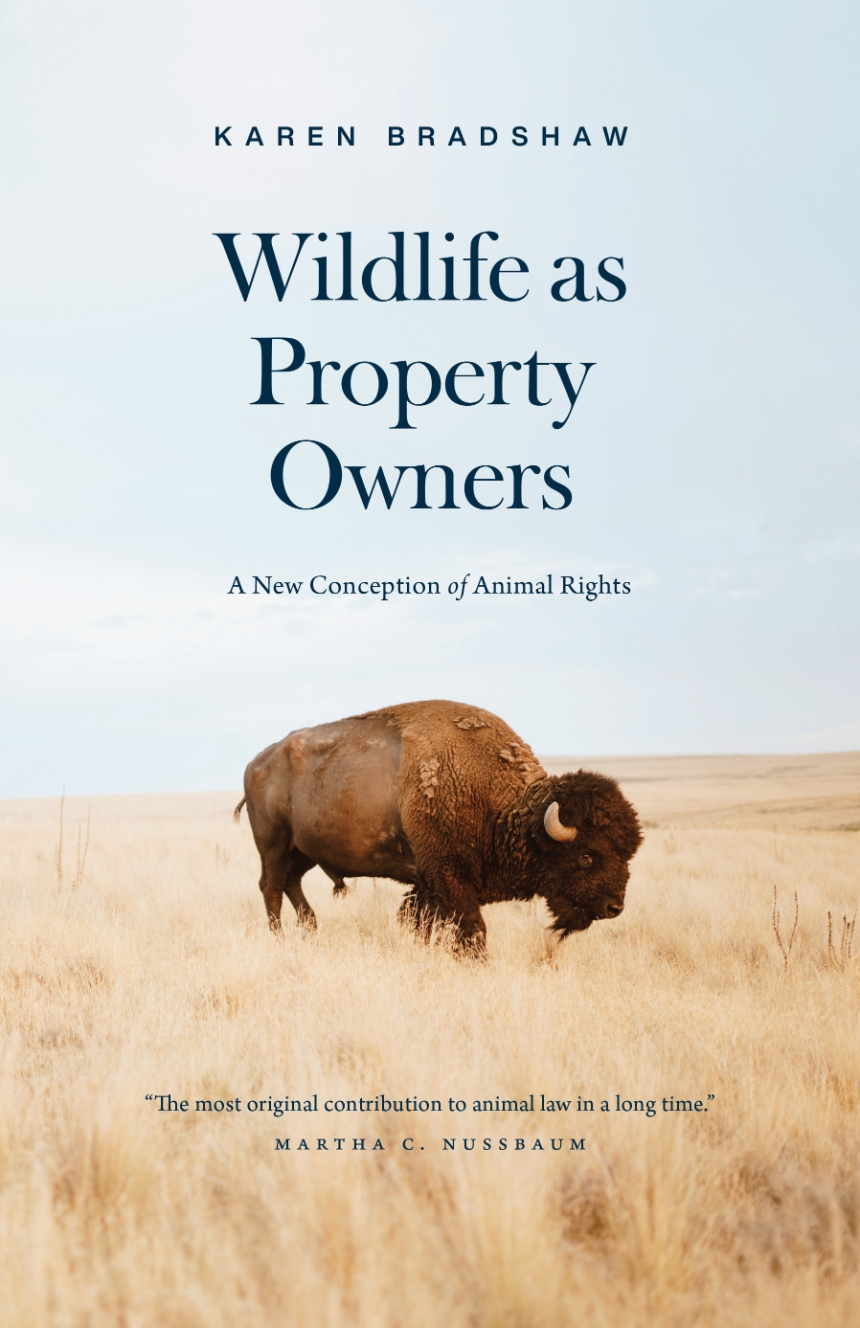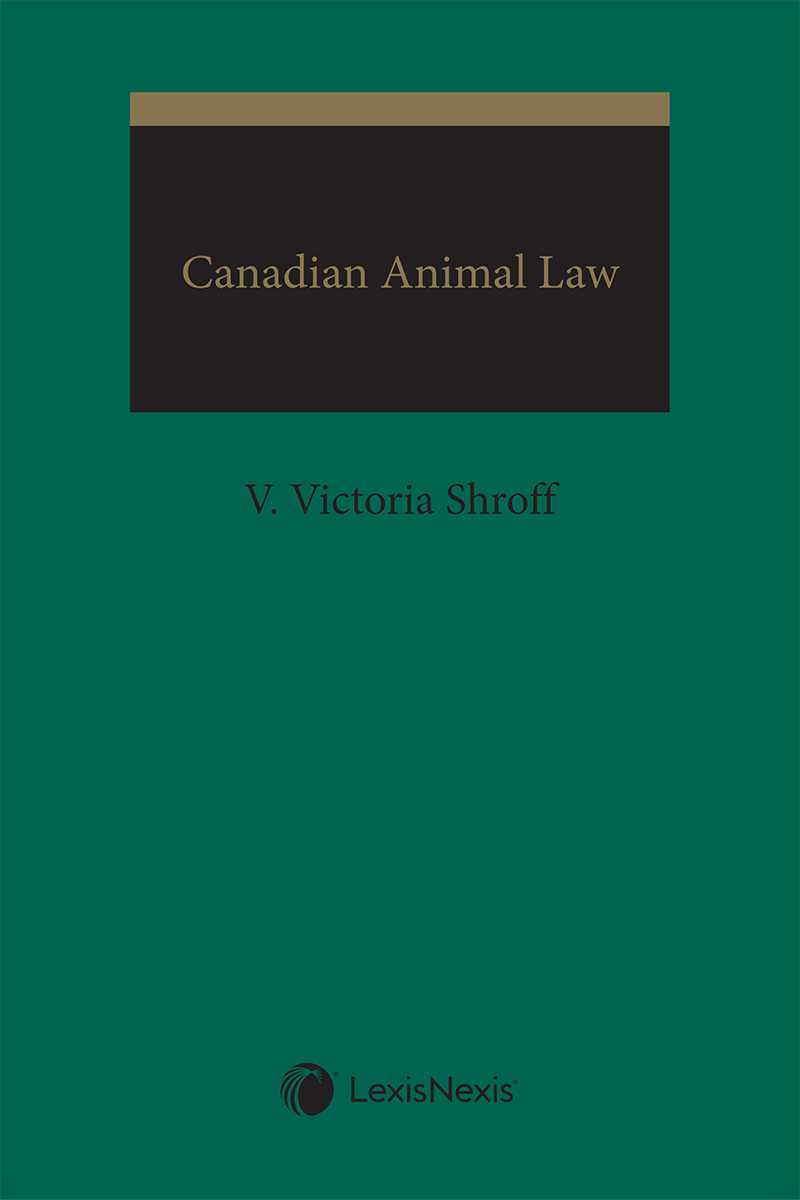
Not sure where to start? Here are some phrases you can try in Credo, OMNI, or other search tools:
- "Animal Rights"
- "Animal Welfare"
- "Farm law"
- Animals AND Law
Librarian
Select eBooks
The Future of Animal Law by David Favre
This unique book establishes potential future avenues within the law to enhance the welfare of animals and grant them recognized legal status. Charting the direction of the animal-human relationship for future generations, it explores the core concepts of property law to demonstrate how change is possible for domestic animals.Animal Welfare and International Trade Law by Katie Sykes
This thought-provoking book examines the rise of animal welfare as a serious policy concern in the international trade law regime. The central focus is an in-depth study of the background and legal analysis of the landmark EC - Seal Productscase, which confirmed the importance of animal welfare in WTO law.Animal Welfare and International Environmental Law by Werner Scholtz (Editor)
At a time when the planet's wildlife faces countless dangers, international environmental law continues to overlook its evolving welfare interests. This thought-provoking book provides a crucial exploration of how international environmental law must adapt to take account of the growing recognition of the intrinsic value of wildlife.Animals As Crime Victims by Lacey Levitt, Jessica Rubin, David B. Rosengard (eds)
This innovative and prescient book offers a multidisciplinary framework which reconceptualizes maltreated animals as crime victims. Articulating more active and involved responses to animal maltreatment, Animals as Crime Victimsprovides guidance to attorneys, law enforcement personnel, veterinarians, and educators by reimagining how animals are positioned within the law.
Canadian Perspectives on Animals and the Law
With contributions from professors and lawyers across Canada, Canadian Perspectives on Animals and the Law aims to help enrich the discourse on animals and the law in Canada by situating doctrinal issues and legal developments in the broader context of ethical and philosophical debate about human-animal relationships.Animals and the Law by Lesli Bisgould
Animals and the Law examines the unique role that animals play as living property in a legal system conceived by and for human beings. On the one hand, animals are things that we buy, eat, and use in experiments. On the other, they are beloved family companions. This book traces the history of laws dealing with animals.
Global Animal Law from the Margins by Iyan Offor
This book critically engages the emerging field of global animal law from the perspective of an intersectional ethical framework. Reconceptualising global animal law, this book argues that global animal law overrepresents views from the west as it does not sufficiently engage views from the Global South, as well as from Indigenous and other marginalised communities. Tracing this imbalance to the early development of animal law's reaction to issues of international trade, the book elicits the anthropocentrism and colonialism that underpin this bias. In response, the book outlines a new, intersectional, second wave of animal ethics. Incorporating marginalised viewpoints, it elevates the field beyond the dominant concern with animal welfare and rights. And, drawing on aspects of decolonial thought, earth jurisprudence, intersectionality theory and posthumanism, it offers a fundamental rethinking of the very basis of global animal law. The book's critical, yet practical, new approach to global animal law will appeal to animal law and environmental law experts, legal theorists, and those working in the areas of animal studies and ecology.
Animals as Legal Beings
In the ongoing quest to protect animals from exploitation, this book discusses "beingness," as an alternative to "personhood," as the more impactful and animal-centered legal status that recognizes and values animals for who they are.Animal Rights by Cass R. Sunstein (Editor); Martha C. Nussbaum (Editor)
Contributors to this volume explore the legal and political issues that underlie the campaign for animal rights and the opposition to it. Ethical questions on ownership, protection against suffering and the ability of animals to make their own choices free from human control are thought-provokingly examined.
Media
- Canadian Animal Law Trailblazer (Lexis Podcasts)"Author and legal practitioner Victoria Shroff shares her professional journey and career achievements as an animal law advocate; what it's like being a mentor; and advice for women entering the legal profession."
- Animal Justice: BlogAnimal Justice is Canada’s only national animal law advocacy organization.
- The Whale and the RavenDirector Mirjam Leuze’s The Whale and the Raven illuminates the many issues that have drawn whale researchers, the Gitga’at First Nation, and the Government of British Columbia into a complex conflict. As the people in the Great Bear Rainforest struggle to protect their territory against the pressure and promise of the gas industry, caught in between are the countless beings that call this place home.
- Pit Bulls Unleashed: Should They Be Banned?It's a fact that pit bulls, with their powerful jaws, can kill and maim. But are pit bulls born bad or do humans make them that way? Therein lies an emotional - sometimes vicious - debate. On one side, traumatized families and public safety advocates. On the other, a powerful group of lobbyists who say that pit bulls are misunderstood and legislation to ban the breed is misguided. The Fifth Estate's Mark Kelley speaks to concerned parties on both sides of the debate. Warning: This program contains scenes that may be disturbing to some viewers. Viewer discretion is advised.
Select Legislation
- Provincial and territorial legislation concerning farm animal welfareGov of Canada website explaining legislation relating to farm animal welfare with provincial breakdowns.
- Health of Animals ActAn Act respecting diseases and toxic substances that may affect animals or that may be transmitted by animals to persons, and respecting the protection of animals
- Criminal CodeWilful and Forbidden Acts in Respect of Certain Property (444-447, Animals & Cruelty to Animals)
Select Journals
Key Databases
- HeinOnline This link opens in a new windowSee: Animal Studies: Law, Welfare, and Rights (US); Canadian journals/legislation/cases
Also includes:
*Selden Society Publications and the History of Early English Law
*Scottish Legal History: Featuring Publications of the Stair Society
*Air and Space Law
*John F. Kennedy Assassination Collection
*Executive Privilege
*Business and Legal Aspects of Sports and Entertainment (BLASÉ) - CanLII (Canadian Legal Information Institute) This link opens in a new window
Provides access to court judgments, tribunal decisions, statutes and regulations from all Canadian jurisdictions.
- Westlaw Edge (Law Students Only) This link opens in a new windowDatabase of Canadian law and legal research. Law students will need to register for this product.
- EcoLex This link opens in a new windowECOLEX is an information service on environmental law, operated jointly by FAO, IUCN and UNEP.
- Lexis+ Canada - for Law Students only (formerly Lexis Advance Quicklaw) This link opens in a new windowLexisNexis upgraded legal database for Canada with comprehensive primary and secondary sources.
All new Law Students will need to register for this product.
Other Links
- United Nations Convention on Animal Health and Protection (UNCAHP)UNCAHP is a unique initiative to globally protect animals at the UN level.
- Animal Law 101 2022 conferenceFrom the Continuing Legal Education Society of British Columbia (CLEBC)
- Brooks Animal Law Digest: Canada EditionThe Canada Edition of the Brooks Animal Law Digest is published twice monthly with the support of the University of Toronto Faculty of Law.








